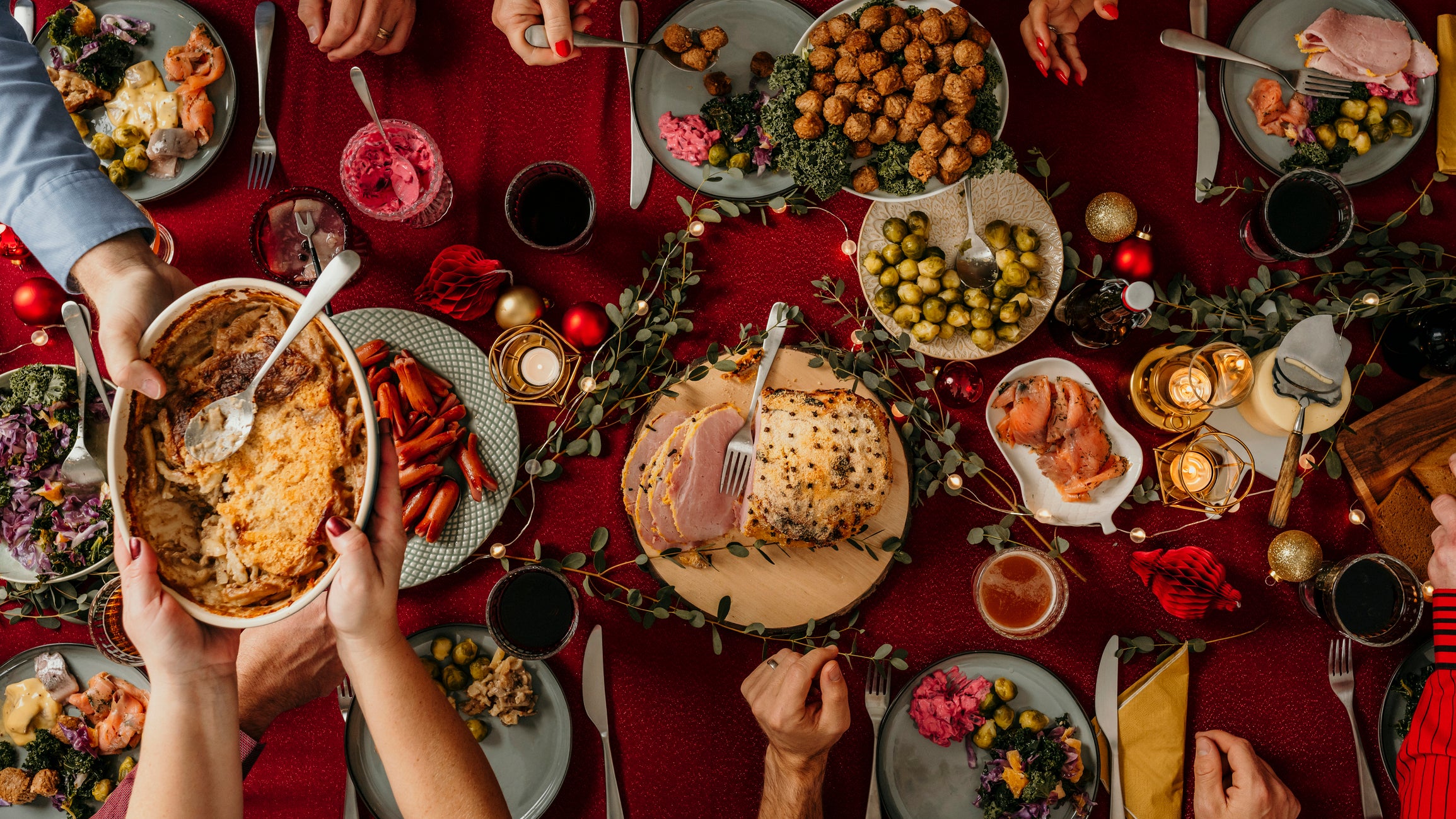The Best and Worst Holiday Foods to Eat

It’s the holiday season, and that means plenty of opportunities for feasting. It doesn’t matter, because the foods you eat at the holidays don’t count, right? Well, not so fast. Research indicates that weight gained over the holidays tends to stick around, and a 2013 study showed that people gain about two pounds on average during this festive time of year, along with increasing their body fat, blood pressure, and heart rate. So, does that mean you have to forego the holiday meals and sit dolefully eating steamed veggies all season? No, but there are a few favorites that you might want to skip.
- We have some bad news about eggnog. Packed with sugar, eggs, and cream, it’s full of calories, cholesterol, and saturated fat. In fact, drinking a cup of eggnog is approximately the nutritional equivalent of eating two glazed donuts. What’s more, homemade eggnog often contains raw eggs, which can be a health hazard. Does this mean you should only drink water all season? Water is great for your body, but if you want something a little more festive, hot cocoa is a good egg-nog alternative. Not only can it be made to have far fewer calories and much less fat, using unsweetened cocoa, low-fat milk, and minimal sugar, but hot cocoa contains flavanols, a type of antioxidant that can improve blood vessel function. One study even found that cocoa boosts blood circulation in the brain and may even enhance cognitive function.
- Pecan pie and mincemeat pie are definitely on the naughty list. Because pecan pie is made with karo syrup and sugar, this sweet treat weighs in at about 500 calories, 27 grams of fat, and 15 teaspoons of sugar in a single slice. Mincemeat pie is made of sugar, butter, shortening, and eggs, and has almost as many calories and as much fat and sugar as pecan pie. Want some better options? Oatmeal raisin cookies have the flavor of mincemeat for far less nutritional cost, and gingerbread is a great option because lower fat and calorie content than many cookies. It contains molasses, too, which means it’s a good source of iron. Pumpkin pie is also a more nutritious sweet. Full of beta carotene, it also has half your recommended daily allowance of vitamin A.
- Stuffing and potatoes can be good or bad, depending on how they’re prepared. When stuffing is prepared with butter and turkey fat, it’s high in fat and calories. Made with vegetables and stock, baked outside the bird instead of inside it, it becomes a healthier option. Potatoes made with butter and cream or smothered in gravy are also a poor choice, but if you make your mashed potatoes with milk or non-fat Greek yogurt, or you roast them and sprinkle them with rosemary, you’ll reap the benefits of the potatoes themselves. Potatoes are low calorie, low carb, and full of nutrients like potassium, magnesium, iron, and vitamin C. Sweet potatoes are also packed with nutrition, with vitamins A and C, antioxidants, and fiber, and they don’t need sugar, butter, and marshmallows to make them flavorful and delicious.
- Skip the prime rib if you’re trying to make your holiday table healthful. The reason prime rib is so succulent is that it comes from the fattiest part of the cow. If your holiday traditions call for beef, you’re better off with a leaner cut like sirloin.
- Turkey is a holiday tradition worth keeping. Without the skin, a four-ounce serving of turkey breast only contains 168 calories and two grams of fat! It also has plenty of protein, along with vitamins B3, B6, and B12, selenium, zinc, phosphorus, choline, magnesium, and potassium.
- There are other holiday favorites worth the indulgence, as well. Cranberries are powerhouses of nutrition, boasting healthy amounts of vitamin C, manganese, vitamin E, vitamin K, copper, and plant compounds known as polyphenols, which can help the body process glucose. Commercial cranberry sauces are full of sugar, but you can cut back if you’re making it at home, or replace it with fruit juice. Nuts, especially chestnuts, are healthy holiday fare, and shrimp cocktail is a festive appetizer that’s low in fat and calories and high in nutritional value.
A healthy lifestyle means packing your plate with nutritious foods, and a healthy diet can help promote a healthy pregnancy. At the Center for Vasectomy Reversal, we love helping people start families with healthy pregnancies. We pride ourselves on helping men improve their fertility through uncompromising, concierge-level patient care. Under the direction of Dr. Joshua Green, our team provides state-of-the-art treatment for men who need a reversal of their vasectomy or have other fertility concerns. To learn more, contact us through our website or call 941-894-6428.
Recent Posts
Popular Posts
categories
- Uncategorized
- Sperm Retrieval
- vasectomy reversal
- Emergency
- Dr. Green
- sperm count
- fertility
- male infertility
- MESA
- medical care
- low sperm count
- IVF
- male fertility testing
- anesthesia
- pregnancy
- sperm aspiration
- semen analysis
- post-vasectomy pain syndrome
- infertility
- VE
- anti-sperm antibodies
- older dad
- general anesthesia
- gender reveal party
- post-operative infections
- baby name
- parent
- baby's first year
- fertilization process
- spinal anesthesia
- ACS Fellow
- nutrition tips
- concierge-level care
- fertility planning app
- azoospermia
- out-of-town patients
- V-V
- post-vasectomy reversal
- conceiving
- vasectomy
- vasoepididymostomy
- smoking
- sperm quality
- baby registry
- infographic
- surgical care
- surgical consultation process
- prostate cancer
- baby gender
- family time
- COVID
- Baby Shower
- Child Care
- Halloween Costume Ideas for Babies
- Halloween
- Halloween Safety Tips
- Celebrity Infertility Spotlight
- Postpartum
- testosterone
- Father's Day
- Father
- Men's Health
- Thanksgiving
- Pregnancy Announcement
- Parenting Tips
- Sperm
